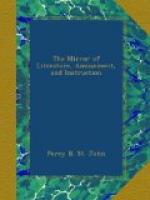The envy of each son of song.
There too were those of later years,
Who’ve moved the mind to mirth or tears:
Byron, with his radiant ray—
Scott, with many a magic lay—
The gay and gorgeous minstrel, Moore,
Rich in the charms of Eastern lore—
Campbell, like a brilliant star,
Shed the beams of “Hope” afar—
Rogers, with a smiling eye
Told the joys of “Memory,”
Southey, with his language quaint,
Describing daemon, sinner, saint—
Wordsworth, of the simpler strain,
Clare, the young unletter’d swain—
Wiffen, who in fairy bowers,
Culls blossoms in “Aonian hours,”
Shone like a star in dusky skies,
When first the evening shades arise.
Barton, the gentle bard, was there,
And Hemans, tender as she’s fair—
And Croly, whose bright genius beams
Ever on virtue’s fairest themes;
With Burns, the muse’s darling child—
And Luttrell, laughing, sportive, wild,
As when be penn’d for Julia’s eye,
His sweet “Advice” for what? for why?
And Crabbe, who misery portrays,
With crowds of others, crown’d with bays,
Who shed around their bright’ning beams,
And cheer’d a humbler poet’s dreams.
* * * * *
ANCIENT SITE OF THE EXETER ’CHANGE, &c.
(For the Mirror.)
Here was formerly the parsonage-house for the parish of St. Clement Danes, with a garden and close for the parson’s horse, till Sir Thomas Palmer, knight, in the reign of Edward VI., came into the possession of the living, and began to build a house; but upon his attainder for high treason, in the first year of Queen Mary, it reverted to the crown. This house remained in the crown till Queen Elizabeth granted it to Sir William Cecil, lord treasurer, who augmented and rebuilt it, when it was called Cecil House, and Burleigh House. It was said to have been a noble pile, and adorned with four square turrets. It was afterwards called Exeter House, from the title of his son and successor. Lord Burleigh died here in 1598. It fronted the Strand, and its gardens extended from the west side of the garden-wall of Wimbledon House to the Green-lane, which is now Southampton-street. Lord Burleigh was in this house honoured by a visit from Queen Elizabeth, who, knowing him to be subject to the gout, would always make him to sit in her presence, which, it is probable, (says Nightingale,) the lord treasurer considered a gteal indulgence from so haughty a lady, inasmuch as he one day apologized for the badness of his legs. To which the queen replied, “My lord, we make use of you not for the badness of your legs, but for the goodness of your head.” When she came to Burleigh House, it is probable she had that kind of pyramidial head-dress then in fashion, built of wire, lace, ribands, and jewels, which shot up to a great height; for when the principal domestic




